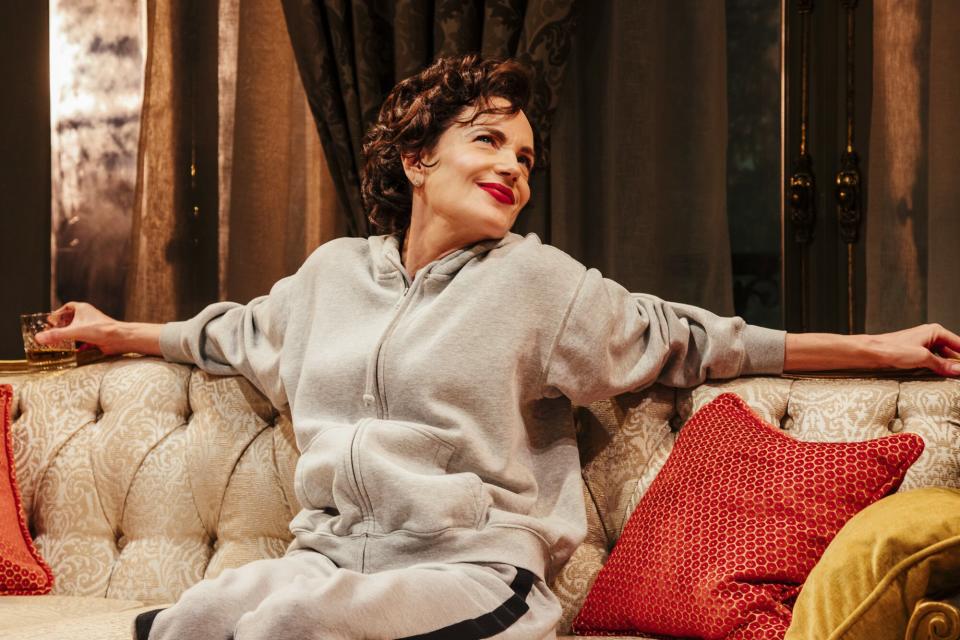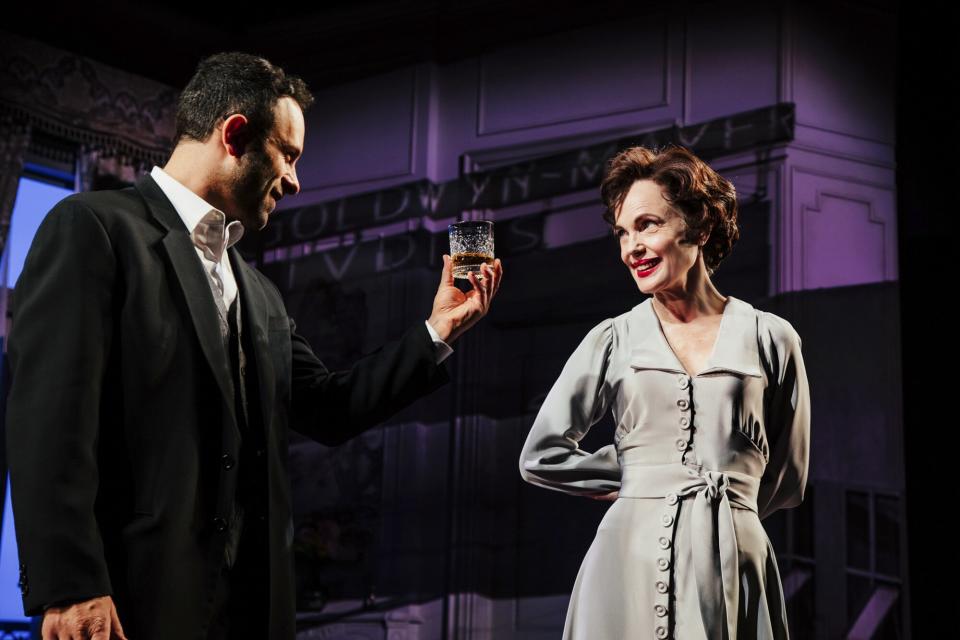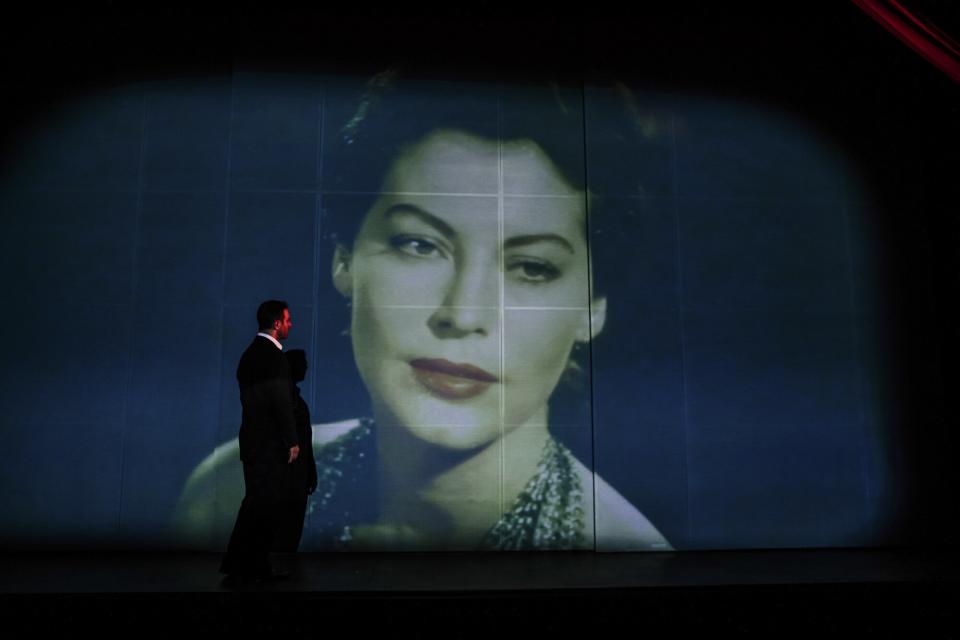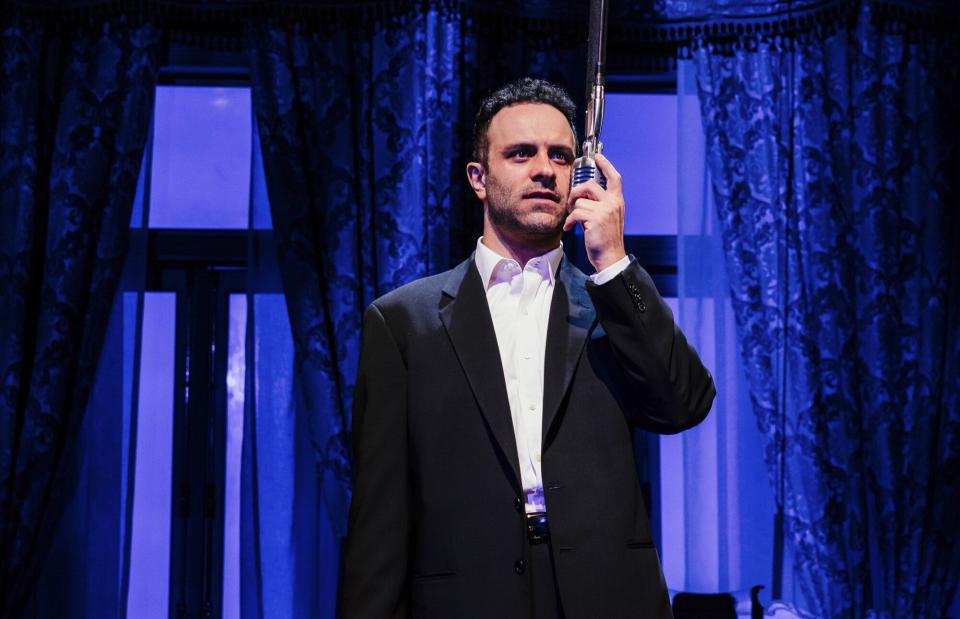Ava: The Secret Conversations review: Elizabeth McGovern is mercurial and inscrutable as Ava Gardner

- Oops!Something went wrong.Please try again later.
The stars of the Golden Age of Hollywood are more image than substance, more enigma than knowable.
That paradox between the ubiquity of their face and the truths of their innermost lives is at the heart of Ava: The Secret Conversations, now making its North American premiere at Los Angeles' Geffen Playhouse.

Photos by Jeff Lorch. Credit: The Geffen Playhouse Elizabeth McGovern in 'Ava Gardner: The Secret Conversations'
Written by and starring Elizabeth McGovern (best known to audiences in recent years on Downton Abbey) as screen siren Ava Gardner, the play centers its brisk 90-minute run time around a series of real interviews that occurred between Gardner and journalist Peter Evans near the end of her life, and eventually chronicled in Evans' book The Secret Conversations, transcribing their talks verbatim.
McGovern, as playwright, takes the hard and fast fact of those printed dialogues and conjures them into a memory play, something that feels more surreal and dreamlike than one might expect from a play constructed from real interviews. Evans, played by Aaron Cotsa Ganis, has conversations with his offstage agent Ed (Ryan W. Garcia), as he attempts to get a story out of the mercurial Gardner. But as she recalls her notorious love affairs with the likes of Mickey Rooney, Artie Shaw, Howard Hughes, and Frank Sinatra, Ganis also transforms into these men, bringing Gardner's memories to life.
Both McGovern and Ganis, who carry the action alone save for Garcia's disembodied voice, are powerful forces. McGovern transforms from the disabled, post-stroke Gardner of her later years, to a spritely, naive teenager and a jaded movie star. It's a slippery performance, her switch from one version of Gardner to another, fluid and nearly imperceptible. At one moment, she's an aging star telling her life story for the money and the next she's a screen goddess at the height of her powers. She's mesmerizing when Gardner's tempestuous nature and legendary temper explode in sudden and unexpected ways.

Photos by Jeff Lorch. Credit: The Geffen Playhouse Aaron Cotsa Ganis toasts Elizabeth McGovern in 'Ava Gardner: The Secret Conversations'
It's particularly intriguing watching McGovern in this role, as both actress and playwright, because of her own story. Her star skyrocketed in the 1980s with her work in films such as Ragtime and Once Upon a Time in America, but in 1992, she largely left Hollywood behind, retreating like Gardner, to Britain. Of course, modern movie stardom can't compare to the publicity machine and obsessive control of the studio era, but McGovern knows what it is to find yourself under a microscope and yearn for an escape.
There's a sense that what Gardner is saying about her objectification, her sense that her purpose in life was as a beautiful woman to be loved by men, is something McGovern — through both her writing and her performance — is also eager to comment on. Yet, McGovern for a myriad of reasons was more adept at exploding, or at least abandoning, that box Hollywood is so determined to put young actresses in.

Photos by Jeff Lorch. Credit: The Geffen Playhouse Aaron Cotsa Gains in 'Ava Gardner: The Secret Conversations'
This is also enhanced by the fact that McGovern is never giving us an imitation of Gardner. Yes, she models the transatlantic clipped tones of mid-century stars, tinged with Gardner's North Carolina roots. And she carries herself with Gardner's immense self-possession. But when she's transposed against images of the real Gardner, no one would say there's an uncanny resemblance. Which is wise of McGovern, since the play is about deconstructing the ways in which Ava Gardner was a performance herself.
Ganis has an even more difficult task, and he not only rises to but exceeds the challenge. His mopey, very British Peter Evans dissolves as he flits to the hyper, cracker-jack energy of Mickey Rooney, brutish intellectualism of Artie Shaw, and Lothario cool of Frank Sinatra. Playing one of these men is a tall order, much less all four.
Here also, Ganis, as steered by the direction of Moritz Von Stuelpnagel, avoids full-out impersonation in favor of a more satisfying imprint of the thing. When he takes a mic that descends from the rafters, warbling "One More For the Road," he both sounds remarkably like Sinatra and something altogether unique. It's a strange magic trick, a performance miles more interesting than oft-Oscar-winning biopic roles aided by prosthetics.

Photos by Jeff Lorch. Credit: The Geffen Playhouse Aaron Cotsa Ganis in 'Ava Gardner: The Secret Conversations'
Still, the center of Ava, as a character and a play, will not hold. That's at least somewhat intentional. Ava keeps reminding us that she's having memory lapses, and the play has a fuzzy, gauzy quality to it, blurring the lines between fact and fiction as Gardner tells her story. The play's conclusion, which finds Gardner's apartment turned into a set that is being actively torn down, and Gardner vamping for the camera, is provocative but hollow.
Ava has two electric actors at its center, but it lacks cohesion. It seems to want to say something about the grand performance of Gardner's life, about the push-and-pull between her need to be seen as something more than a glamorous animal and her reluctance (or inability) to pin down any actual truths. In the end, it's a play about how movie stars' greatest roles are often themselves, the persona dissected and displayed in the press. Gardner never believed herself a great actress and was rarely given material to prove herself otherwise. That flimsiness carries over to the play itself, a shallow, yet murky meditation on an icon. B
Related content:

